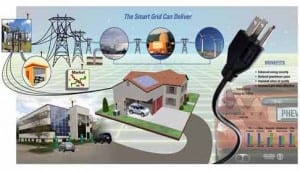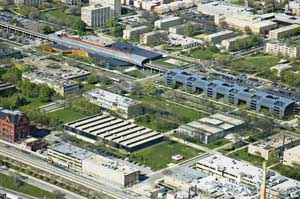Smart Grid
-
Coal
Energy R&D: The Missing Link to a Sustainable Energy Future
Q: What do you get when you gather roughly two dozen top researchers from academia, government, and industry to speak on interdisciplinary energy-related issues for a week?
A: A lot of informative but crowded slides, high-octane brain power, fact-based analysis of where we are and we’re headed globally, informed questions, and surprisingly practical answers. -
Smart Grid
IEEE Celebrates 125 Years of Engineering the Future Today
As IEEE celebrates its 125th anniversary on May 13, it is also addressing the challenges ahead. The Center for Energy Workforce Development estimates that 45% of engineers in electric utilities will be eligible for retirement, or may leave for other reasons, in the next five years. What’s more, the educators of new engineers are also […]
-
Smart Grid
Is "Smart Grid" in the Eye of the Beholder?
Congress looks at what “smart grid” means and comes up with mixed definitions. The one thing everyone agrees on: The smart grid is going to be expensive.
-
Smart Grid
VP Biden Announces Nearly $4 Billion for Smart Grid
On Thursday, while visiting Jefferson City, Mo., with Commerce Secretary Gary Locke, Vice President Joe Biden announced that, as part of the American Recovery and Reinvestment Act, more than $3.3 billion in smart grid technology development grants and an additional $615 million for smart grid storage, monitoring, and technology viability were being made available.
-
Smart Grid
Cyberspies Have Hacked into U.S. Grid, Officials Say
Experts assert that the U.S. grid—already proven by federal agencies to be vulnerable to cyber attacks—has been compromised by spies who tried to map the system and left bugs that could be used to disrupt networks at a time of war or crisis.
-
Smart Grid
EPRI Contracted to Develop Smart Grid Interim Standards
The National Institute of Standards and Technology (NIST), an agency of the U.S. Department of Commerce, has contracted the Electric Power Research Institute (EPRI) to help it develop an interim road map to harmonize interoperability standards for the smart grid.
-
Commentary
Transforming the U.S. Grid
Al Gore, in his recent New York Times op-ed titled "The Climate for Change," calls for a "$400 billion investment over ten years to construct a national smart grid to distribute renewable energy." Echelon supports these proposed investments. We also believe the answer is not just in constructing something new but in transforming the existing […]
-
Distributed Energy
In Search of Perfect Power
What do you do when your research institution is losing roughly half a million dollars annually as a result of multiple electricity outages — and electricity demand keeps rising? If you’re the Illinois Institute of Technology, you turn the challenge into a campuswide learning experience by teaming with the Galvin Electricity Initiative and other experts to design and construct a prototype Perfect Power System (PPS). Even during its implementation, the PPS promises to provide more reliable and sustainable electricity to the university at a lower cost than it had been paying.
-
Smart Grid
House Dems Introduce Draft for Comprehensive Clean Energy Act
House Democrats on Tuesday unveiled a 648-page discussion draft of the “American Clean Energy and Security Act of 2009,” a bill touted as a “comprehensive approach to America’s energy policy” because it seeks to establish, among other things, a carbon emissions reduction goal, a cap-and-trade program, and a federal renewable energy standard.
-
Smart Grid
More Transmission Lines Equal the Same Dumb Grid, Institute Warns
Building new transmission lines indicates support for the development of a national grid, but doing so would ultimately stifle entrepreneurship and innovation, a campaign focused on the creation of a “perfect” consumer-focused electric energy system has warned.


